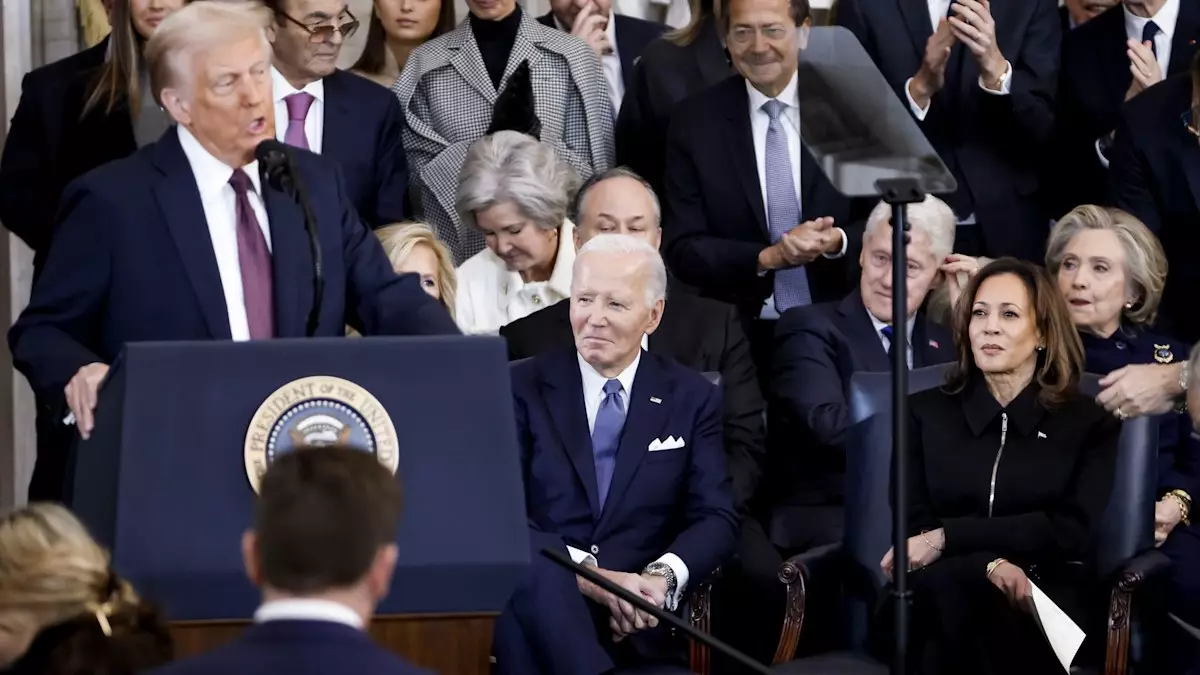Donald Trump’s inauguration marked a contentious moment in American political history, emblematic of a deep national division. The stage was set as Trump delivered a fiery speech that resonated with his base while simultaneously veiling veiled critiques aimed at current and former political figures, specifically targeting Joe Biden. The atmosphere was electric, not solely from the applause and cheers that erupted from his supporters, but also from the palpable tension—evident by the stark contrast between Trump’s jubilant crowd and the silent, seemingly disapproving figures of Biden and Kamala Harris seated nearby.
This dichotomy was central to Trump’s messaging, as he sought to frame his presidency as a radical departure from the status quo. By invoking the notion of “America’s decline” and promising its restoration, Trump plunged headfirst into a narrative of victimhood mingled with triumph. His rhetoric created a stark ‘us versus them’ mentality, positioning himself as the savior of a beleaguered nation. The implications of this approach extend beyond mere oration; they amplify existing divisions in American society.
A striking feature of Trump’s address was his personal narrative, particularly the recounting of his brush with danger during a recent rally in Pennsylvania. By framing the incident as an assassination attempt, Trump invoked a sense of martyrdom while asserting that his survival was divinely orchestrated. This self-centered narrative not only sought to galvanize his base but also served as a rhetorical device reinforcing his claim to leadership—a leader who has been tested and yet rises from personal adversity.
The notion of being a chosen leader took root in his assertion that “My life was saved for a reason.” By positioning his existence as a pivotal factor in America’s future, Trump effectively blurred the line between individual identity and national destiny. This approach plays deeply into the psychology of his supporters, creating an emotional investment in his administration as not just political but existential.
As he delved into policy, Trump’s proposals echoed the bombastic promises that characterized his campaign. Initiatives like strict immigration reform, the reassertion of control over foreign assets such as the Panama Canal, and the declaration of a “national energy emergency” were presented as steps toward a new era. Although audacious, these proposals are fundamentally anchored in Trump’s overarching narrative of taking back what he argues was lost.
However, the grandiosity of these claims often bypasses critical scrutiny. The feasibility of reimposing American control over the Panama Canal, for instance, raises significant legal and diplomatic questions that seem glossed over in the urgency of his delivery. This marks a common thread in Trump’s rhetoric, where the appeal to nationalism is accompanied by a disregard for practical realities. His statements promise transformation but rely on a simplified view of governance that overlooks the complexities inhered in such sweeping changes.
In closing, Trump’s vision of ushering in a “golden age” encapsulates the quintessentially American idea of renewal and exceptionalism. He encapsulated a hopeful vision of America as a bastion of peace, strength, and unity, proclaiming, “Our power will stop all wars and bring a new spirit of unity to a world that has been angry.” This idealism carries a seductive quality, appealing to a nation weary of conflict and division.
However, the juxtaposition of hope and aggression within his rhetoric—asserting that “we will not be conquered” while simultaneously promising compassion—represents a paradox that reflects a broader struggle within American society. The ambition for a harmonious future is often overshadowed by a combative stance against perceived adversaries. This duality exemplifies the challenges that lie ahead for any administration seeking to bridge the growing divides in American politics.
Ultimately, Trump’s inaugural address serves as both a rallying cry and a warning. While it mobilizes his supporters with promises of revival and strength, it simultaneously deepens the existing rifts within the body politic. The speech encapsulates a moment where the battle for America’s soul—between polarization and unity—was cast in stark relief. As the nation moves forward, the implications of such a rhetoric-driven approach will undoubtedly shape the political landscape for years to come, reminding us that the oratory of leadership can both inspire and divide.

